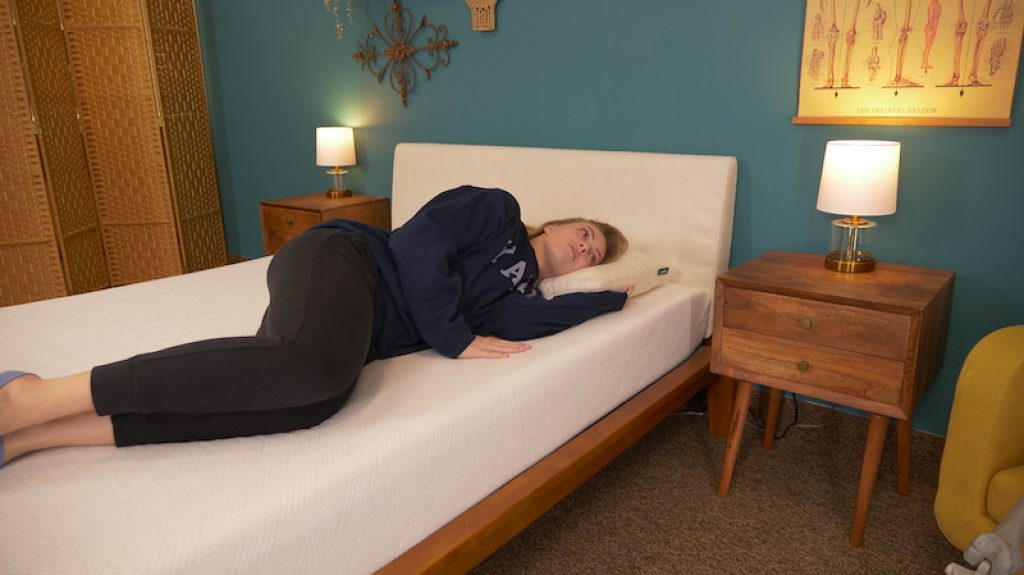Fortunately, we’ve put together this guide on how to sleep with a cold or a sore throat, which includes recommendations for medicinal and natural remedies as well as helpful tips to set up your bedroom as a sanctuary for better sleep.
When you’re sick, you need more sleep than usual. What happens, though, if your cold or sore throat has made you so uncomfortable that rest seems impossible? You’ve probably tried various tips and tricks to get some rest, and if you haven’t had any luck, you’re likely feeling sleep-deprived and frustrated.
Tips for Sleeping With a Cold
Once winter hits, it can be almost impossible to tell which ailment is troubling you. Is it a cold? The flu? Covid?
According to the CDC1, you’ll be able to tell if it’s a common cold by looking out for these symptoms:
- Sneezing
- Stuffy nose
- Runny nose
- Sore throat
- Coughing
- Mucus dripping down your throat (post-nasal drip)
- Watery eyes
- Symptoms usually peak within 2-3 days
Also, colds tend to be worse at night, which is not great news for sleep. The reason behind this is hormones. More specifically, throughout the day and night, our bodies maintain a balance of melatonin and cortisol.
Melatonin is considered a sleep hormone, and cortisol is thought of as a stress hormone. However, cortisol also helps your body fight infections2 and inflammation. So, at night when melatonin levels rise to prepare the body for sleep, corresponding cortisol levels drop. The result is an exacerbation of cold and sore throat symptoms.
What, then, can you do to get some sleep when cold symptoms will only be worse at night?
Certain over-the-counter medications won’t cure the cold or sore throat, but they will ease the symptoms and make recovery more comfortable. Before ingesting anything, read the labels carefully. For example, if you’re on your way to work, don’t take a nighttime relief medicine because it will make you drowsy.
You’ll also want to avoid daytime formulas after 6:00 p.m. Many of these medicines have a stimulant effect, which could keep you awake and slow down your recovery.
How to Sleep With a Stuffy Nose
1. Use nasal spray decongestant
One of the benefits of a nasal spray decongestant is the instant relief of a blocked nose without having to take medicine orally, which could cause unanticipated side effects. Another reason that nasal sprays are at the top of our list is that they go to work on your stuffy nose immediately, unlike an oral pill that can take several minutes or up to an hour to kick in.
According to Cleveland Clinic3, they do this by targeting inflammation in your nasal passages, which reduces swelling and helps clear up stuffiness. If you choose a nasal spray, make sure you only use it for a couple of days. Longer-term use can irritate the mucous membranes and cause even more inflammation.
2. Try nasal strips
Nasal strips are cheap, effective, and drug-free. This simple strip sits across the bridge of your nose and works to lift the tissue around the nasal cavity. The result is a clearer airway and easier breathing.
Another reason these are so popular is that they help with snoring. People with colds often snore, and a nasal strip helps prevent it.
3. Use saline spray
Saline solution is simply a mixture of water and salt, and this saltwater combination has an incredible cleansing effect on nasal passageways. You can make your own using water that’s either lukewarm distilled or has been boiled and combine that with iodide-free salt and baking soda. However, avoid using just boiled water to prevent burning your nasal passages.
Then, we suggest using a Neti pot4, which looks like a miniature teapot. Tilt your head to the side and pour the spout into one nostril. Make sure you’re near a sink or drain. Finally, watch in either disgust or delight as all the gunk from your nose spills out the other nostril and down the drain.
The American Academy of Allergy, Asthma, & Immunology5 recommends this simple saline solution recipe:
- Mix 3 teaspoons of iodide-free salt with 1 teaspoon of baking soda in a clean container
- Add 1 teaspoon of this powdery mixture to 8 ounces of warm water (either distilled or previously boiled)
- Use the neti pot to squeeze approximately 4 ounces of the solution gently into the right nostril, and then into the left
4. Take a steamy shower
A shower is a helpful strategy for falling asleep, even when you’re not sick. Taking a shower is relaxing and a great way to end the day, washing off all the stress and struggles from work, school, or family life.
Showering helps to relax your muscles, prepare you for bedtime, and could help with decongestion, especially when you set the water temperature high for a maximum steaming effect6.
5. Eat some chicken soup or drink a hot beverage
Hot soup and hot beverages for congestion are constantly touted for a reason. According to Penn Medicine7, there are scientific benefits of eating something like chicken soup when you’re sick. The sodium from the soup helps relieve sore throat pain, the heat helps clear nasal congestion and relieve pain and sinus pressure, and the vitamins and minerals in these veggie and protein-filled soups can speed recovery.
These also help you stay hydrated, which is important in combating inflammation, though you should drink plenty of water as well.
6. Use a humidifier
A humidifier can help you breathe easier, especially when you have a cold. They’re especially adept at easing congestion, making sleep onset come much faster. If you use one of these devices, make sure you clean it regularly and use distilled water only. If a humidifier is not properly maintained, it can become a breeding ground for bacteria8, which could make you sicker.
How to Sleep With a Sore Throat or Cough
1. Use mentholated gel
Many parents and grandparents have sworn by mentholated gels like Vicks VapoRub. Menthol9 in gel form is effective – you just rub it on your bare chest and it goes to work, breaking up congestion. Additionally, it has a cooling effect, which is refreshing for those with fevers.
This probably goes without saying, but don’t eat it or put it up your nose. Also, it’s not recommended for children under two years of age.
2. Try cough syrup
Coughing can be painful and keep you awake. If you have a dry cough, then a cough suppressant in the form of cough syrup will go a long way toward helping you sleep better.
Again, check the label of your preferred brand. Some formulas contain acetaminophen and an antihistamine. If you’ve already taken medications with those ingredients, you should avoid doubling up.
3. Gargle with saltwater
We’ve covered that saltwater is ideal for clearing the sinuses., but it’s also effective at dulling the pain of a sore throat. Saltwater works exceptionally well if you gargle it at the first sign that you’re getting sick.
Gargling with salt10 works by submerging the cells and drawing liquids to the surface, along with any virus and bacteria in the throat. When you spit it out, you’ll rid the body of those germs.
Plus, the moisture of the water alone will act as a lubricant to soothe irritation in the throat. One study11 showed that regularly gargling just water was enough to prevent upper respiratory infections among healthy people.
Our only caution with this technique is to avoid swallowing the water. Otherwise, you may feel nauseous.
How to Sleep With a Headache or Fever
Take a pain reliever
For headaches and fevers, an over-the-counter pain reliever like Tylenol or Advil can provide much-needed relief. Tylenol contains acetaminophen and Advil contains ibuprofen. Both block the enzymes12 the body needs to make something called prostaglandins, which play a role in transmitting pain, generating fever, and promoting inflammation.
As stated earlier, check the labels to ensure that you don’t take a daytime formula at night and vice versa. Also, follow the directions on the label to take it as safely as possible.
Try essential oils
There are so many essential oils out there, you can practically find one for any ailment, mood, or desired effect. We’ll name a few for headaches and fevers specifically, though.
Peppermint oil13 is widely considered a headache aid because it contains menthol, which can help relax muscles and ease pain. To use, dilute it with a carrier oil (like coconut oil) and apply it to the temples.
Lavender oil is commonly used to improve sleep and reduce stress and anxiety. Research shows14 it can be an effective treatment for managing an acute migraine. To use, inhale it through the nose.
Chamomile oil is another great option for relieving headaches. Just as you might drink chamomile tea to promote relaxation and relieve stress, research15 shows that chamomile oil can be used topically for the same results. Just be sure to dilute it in water because too much chamomile can cause toxicity16.
Get More Info: Best Essential Oils for Sleep
Try a massage
A study17 published in the Journal of Headache and Pain found that massage therapy had a significant effect on headache pain intensity, and could reduce it by 71 percent.
If you don’t have someone around who can give you a massage when your head is pounding, there are plenty of self-massage techniques you find while searching on Google or YouTube.
Best Sleep Positions for a Stuffy Nose and Other Sleep Tips
Sleep on your side
Side sleeping can help drain one side of your nasal passageways if one of them is more blocked than the other. We also suggest propping up your head while on your side to help drain the sinuses.

Elevate your head
As mentioned above, propping your head up is useful to clear the nasal passages. We recommend investing in a wedge pillow and using it to keep your head elevated for sleeping when you have a cold or stuffy nose. This should allow for that congestion (that tends to build up at night) to drain more easily.
Look for a wedge pillow that has a more natural and gradual incline, so that you’ll be able to use it for both back and side sleeping. You can also use your wedge pillow to sit up in bed and watch
television while on the road to recovery.
Learn More: Benefits of Sleeping with Head Elevated
Be careful sleeping on your back
Back sleeping may be comfortable, but if you do it without an elevated pillow when you’re sick, it will likely cause you to become more congested and lead to excessive snoring. People tend to snore more when they’re on their backs, and when combined with congestion or a cold, it’s a surefire way to make snoring more prominent. Again, a wedge pillow may help here.
Keep your bedroom dark
Bright lights keep you awake because they signal your internal clock that it’s daytime and time to get moving. When you want to get some sleep, turn off the lights, draw the blackout curtains, and keep your bedroom as dark as possible.
If you prefer at least a little light in the room, try using a low, red light as a nightlight. This won’t have the same negative impact on your circadian rhythm as white or blue light, which research18 shows will most certainly keep you awake.
Keep a comfortable room temperature
According to the Cleveland Clinic19, the ideal room temperature for sleeping is between 60 and 67 degrees. You may be tempted to heat the room when you’re sick, but that’s not recommended. At the most, bump the temperature up to 72 but don’t turn it into a furnace.
Sleep as much as you can
The American College of Healthcare Sciences20 recommends trying to add one hour of sleep a night when you are sick, as well as at least one or two naps during the day.
We know it can be harder to get good sleep when you feel awful, but it is key to helping you feel better and recover sooner. Research21 shows that most health problems and illnesses increase the body’s need for sleep because sleep has a direct impact on a healthy immune system. Getting a good night’s sleep has also been shown to push T-cells into our lymph nodes22 , which helps destroy germ-infected cells in our bodies.
Final Word of Advice
Whether you’re struggling with a cold, the flu, Covid, or just a sore throat and some congestion, we know how hard it can be to get some quality sleep. There are plenty of things you can do – from taking over-the-counter medications to wafting in essential oils – that will help you when you’re feeling sick. Always remember to keep your head up (literally, elevate your head while you’re sleeping) and gargle saltwater)
Not only can these tips help you sleep better, but the rest you achieve will help speed up your recovery. A final reminder that while our research comes from trusted health sources, we are not medical professionals here at Sleep Advisor, and you should always consult your doctor before starting any new medications, supplements, oils, or other unique treatments.

Natalie G.
Content Writer
About Author
Julia is the Lead Reviewer at Sleep Advisor, specializing in testing out mattresses and sleep accessories – she’s in the right line of work, because she loves to sleep.
Combination Sleeper
References:
- “Common Cold”. Centers for Disease Control and Prevention. Last updated October 6, 2021.
- Morey Jennifer N., et al. “Current Directions in Stress and Human Immune Function”. National Library of Medicine. 2015.
- “Nasal Sprays Work Best When You Use Them Correctly — Here’s How”. Cleveland Clinic. 2022.
- “What Are Neti Pots and Do They Work?”. Cleveland Clinic. 2021.
- “Saline Sinus Rinse Recipe”. American Academy of Allergy Asthma and Immunology. Last modified September 28, 2020.
- Ophir, D., Elad, Y. “Effects of steam inhalation on nasal patency and nasal symptoms in patients with the common cold”. National Library of Medicine. 1987.
- Richter, Greg. “Why Do We Eat Soup When We Have a Cold?”. Penn Medicine News. 2018.
- Heid, Markham. “The Creepy Truth About Humidifiers”. Time Magazine. 2017.
- Pereira, Effie J., et al. “The effect of inhaled menthol on upper airway resistance in humans: A randomized controlled crossover study”. Canadian Respiratory Journal. 2013.
- “Does Gargling with Saltwater Really Help a Sore Throat?”. Albany ENT and Allergy Services. Webpage accessed January 6, 2024.
- Satomura, Kazunari., et al. “Prevention of upper respiratory tract infections by gargling: a randomized trial”. National Library of Medicine. 2005.
- “Acetaminophen vs. Ibuprofen: What’s the Difference?”. Nationwide Children’s. 2022.
- Göbel, H., et al. “Peppermint oil in the acute treatment of tension-type headache”. National Library of Medicine. 2016.
- Faridzadeh, Arezoo., et al. “Neuroprotective Potential of Aromatic Herbs: Rosemary, Sage, and Lavender”. Frontiers in Neuroscience. 2022.
- Amsterdam MD, Jay D., et al. “Chamomile (Matricaria recutita) may provide antidepressant activity in anxious, depressed humans: an exploratory study”. Alternative Therapies in Health and Medicine. 2012.
- Catani, Maria Valeria., et al. “Comparative Analysis of Phenolic Composition of Six Commercially Available Chamomile (Matricaria chamomilla L.) Extracts: Potential Biological Implications”. International Journal of Molecular Sciences. 2021.
- Chiabi, Aleksander., Tuchin, Peter J., Russell, Michael Bjørn. “Manual therapies for migraine: a systematic review”. The Journal of Headache and Pain. 2011.
- “One Color Night Light Is Best For Sleep – But The Color Will Surprise You”. Science 2.0. 2013.
- “What’s the Best Temperature for Sleep?”. Cleveland Clinic. 2021.
- “6 Ways to Bounce Back from Illness Faster”. American College of Healthcare Sciences. 2018.
- Asif, Nayyab., Iqbal, Razia., Nazir, Chaudhry Fahad. “Human immune system during sleep”. American Journal of Clinical and Experimental Immunology. 2017.
- Besedovsky, Luciana., Lange, Tanja., Born, Jan. “Sleep and immune function”. Pfluger Archiv. 2011.
